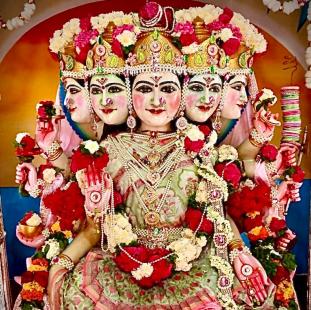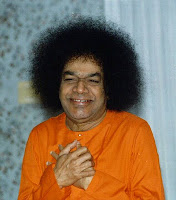Bhagawan has always stressed on the importance of respecting our parents and showing our gratitude to them. He puns on the word “parent” and calls it as “pay rent”. That is we need to pay our rent in the form of gratitude to our parents to whom we owe our very existence. In this posting, Bhagawan elaborates on this obligation of every son and daughter.
There are six Discourse excerpts presented in this posting. These are taken from Divine Discourses given by Bhagawan in the years 1995, 1996 and 2004.
Each audio clip has a name that adopts the following code: Serial number, Title appropriate to the key content, Duration of the Clip, Year-Month-Date of the Audio Clip. Below the title is the translation in English of the select excerpt of the Discourse, followed by the audio player. The post ends with a short quiz that would help you evaluate your assimilation of Bhagawan’s message.
1. Love your Parents-Show your Gratitude to them-3.25-1995 Aug 23
The most sacred teaching of the Vedas in Bhaarath are three – Matru Devo Bhava, Pitru Devo Bhava, Acharya Devo Bhava. Students, this is one aspect you must always bear in mind in future. Who is God? Mother and Father are God. As soon as you are born, you see your mother. It is the father who nurtures you. Therefore, forgetting these physical God’s who are directly in front of you, trying to seek for God elsewhere is of no use. They are the ones who are with us in our difficulties, loss and sorrows, who understand us, and nurture us. Therefore, your blood, food, head and wealth are parents’ gift. Therefore, first you should express your gratitude to your parents. You must respect them. This is the ideal set by Sri Ramachandra. He followed the command of his father, he gave up the kingdom over which he had full right. Today, even undeserving people desire for a kingdom to rule. Rama stood for truth and obeyed the command of his father and followed his word. He was never worried that leaving the kingdom he would have to go to the forest and face difficulties. Therefore, first respect your parents and follow their command. Follow in their footsteps and lead an ideal life. Then only can you be a true devotee. On one side bringing tears in the eyes of your parents and on the other side worshipping the Lord, what is the use? No no, you must love the beings and chant the name of God. There is no greater devotion than Love. Love, love and love. Love your parents first. If you do not love your parents, you can never have true love. Parents were there even before you were born. Without loving your parents who existed even before you did, if you love your wife who has come in the middle, can you achieve anything? Wife and children are the ones who come in the middle, like passing clouds. Parents are of primary importance. They were there even before you were born. Therefore, first love your parents. Respect your parents. Please them. When you make them happy, your life will be happy throughout.
2A. Gratitude to Parents-1.27-1996 July 10
The one who has no inclination to study becomes lazy. He has lot of time, not that he does not have time. He wastes so much time, money and energy and causes so much anxiety to his parents. They get so worried, “what will happen to my child?” You should bring a good name to your parents. Your blood, food, head and money are gifts of parents. Therefore, first you must express gratitude to your parents. You should never be the cause for any anxiety to your parents. Be such ideal students. It is such ideal students whom I often refer to as ‘bangaroo’, ‘bangaroo’. All of you should become gold. What type of gold? Not roll gold but pure gold.
2B. Parents-Respect Them and Never Cheat Them-0.38-1996 July 08
Therefore, our hearts should be full of noble feelings that enable us to make our parents happy and express our gratitude to them. If you cheat your parents and let them down, and go on the wrong path, you are the worst fellow. There is no use of any education. Instead of studying like that it is better if you beg going from house to house.
3. Take care of parents-serve them-do not claim property-1.43-2004 January 12
The moment we get our degrees, we want to run away to foreign countries like America, Japan, Germany etc. In case our parents visit us there, we ask them to go and dine in the restaurant. The modern education does not cultivate the virtue of even serving food to your own parents. Today children are offering such a gory treatment to their parents. No, no, this is not sacred. This is worst of the sins. You should take care of your parents. You should take them close to you. You must take great care of them as they advance in age. Children start claiming their share of the property once parents come of age. Children are ready to share the property but are not ready to nurture a proper mind. We need a proper mind. That will take us to the Supreme state. Try to attain that Supreme state. The more our education, the more should be the virtues in us.
4. Never forget parents-If you do not respect them-You will get no respect-1.56-2004 January 12
If we do not respect our parents, the dogs too will not respect us. The Bhaaratiyas are ruining their life like this today. Whichever country you may go, whatever position you may be in, you must never forget your parents. The Vedas say – Matru Devo Bhava, Pitru Devo Bhava, Acharya Devo Bhava, Athithi Devo Bhava. They nurtured such noble virtues. Bhaarath has fostered such noble virtues in all of us. When we travel to other countries, it makes us forget our parents too. What is the use of such education? Whoever it may be, first respect your parents and follow their command. Such children will reach great and noble heights in their life. Embodiments of love, students, whatever may be the difficulties, you must take care of your parents. Facing any type of challenges, even working a as coolie, they take care of you and bring you up. If you do not respect such parents today, how do you expect the world to respect you?
5. Make your parents happy-Be good-not necessary to be great-1.20-2004 January 12
Children, you have to learn these habits, nurture these traditions, and earn a good name and recognition in the future. Make your parents happy. They should feel happy that their children are listening to them and following their word. If you earn that one repute, it is enough. You cannot earn God’s Grace by just worship and ritual. People should say – see how obedient this person is to his parents. The more you study, your ego increases. It does not enhance your humility and faith. Therefore, make an effort to increase your humility and faith. Then only you will be the future leaders of the country. You do not need to be great. If you are good, that is enough.
A Short Quiz
1. What is the difference between parents as our God and God?
2. What are the four main gifts from our parents to us?
3. How does Bhagawan set priorities in our love towards our parents and our family members?
4. How does Bhagawan reward ideal students who show gratitude to their parents and respect them and make them happy?
5. How does Bhagawan condemn the act of cheating one’s parents and letting them down?
6. What according to Bhagawan should we do rather than claiming a share of our property from our parents?
7. What would be the result if we would not respect our parents?
8. God’s Grace cannot be earned by mere worship and ritual. What is that one thing Bhagawan expects from His students which will earn them His Grace?
9. How does Bhagawan sum up all His expectations in just one phrase?











